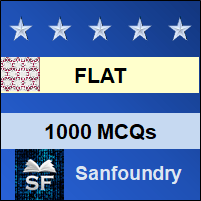
Automata Theory Multiple Choice Questions Highlights
- 1000+ Multiple Choice Questions & Answers (MCQs) in Automata Theory with a detailed explanation of every question.- These MCQs cover theoretical concepts, true-false(T/F) statements, fill-in-the-blanks and match the following style statements.
- These MCQs also cover numericals as well as diagram oriented MCQs.
- These MCQs are organized chapterwise and each Chapter is futher organized topicwise.
- Every MCQ set focuses on a specific topic of a given Chapter in Automata Theory Subject.
Who should Practice Automata Theory MCQs?
– Students who are preparing for college tests and exams such as mid-term tests and semester tests on Automata Theory.- Students who are preparing for Online/Offline Tests/Contests in Automata Theory.
– Students who wish to sharpen their knowledge of Automata Theory Subject.
- Anyone preparing for Aptitude test in Automata Theory.
- Anyone preparing for interviews (campus/off-campus interviews, walk-in interview and company interviews).
- Anyone preparing for entrance examinations and other competitive examinations.
- All - Experienced, Freshers and College / School Students.
Automata Theory Chapters
Here's the list of chapters on the "Automata Theory" subject covering 100+ topics. You can practice the MCQs chapter by chapter starting from the 1st chapter or you can jump to any chapter of your choice.- Finite Automata
- Regular Expressions and Languages
- Properties of Regular Languages
- Context Free Grammars and Languages
- Push Down Automata
- Properties of Context Free Languages
- Introduction to Turing Machines
- Undecidability
- Intractable Problems
- Other Classes of Problems
1. Finite Automata
The section contains multiple choice questions and answers on finite automata, moore and mealy machines, applications of dfa and nfa, language of dfa and nfa and also its processing strings, transition function, epsilon transitions, uses and its closures.
2. Regular Expressions and Languages
The section contains questions and answers on regular expressions and its its operators, buliding and converting the regular expressions, lexical analysis, unix regular expressions, finding patterns in text and algebric laws.
3. Properties of Regular Languages
The section contains MCQs on pumping lemma for regular language and its applications, reversal and inverse homomorphism, conversions and testing emptiness.
4. Context Free Grammars and Languages
The section contains multiple choice questions and answers on context free grammar, inferences, ambiguity, sentential forms, application parser and yacc parser generators, trees derivations, markup languages and ambiguos grammar.
5. Push Down Automata
The section contains questions and answers on pda acceptance by final state and empty stack, conversions from pda to grammar and grammar to pda, dpda, dpda with regular languages, context free languages and ambiguous grammar.
6. Properties of Context Free Languages
The section contains MCQs on cfl closure properties and other normal forms, chomsky normal form, regular languages, eliminating useless symbols, epsilon and unit productions.
7. Introduction to Turing Machines
The section contains multiple choice questions and answers on language of turning machine and its simulation, turning machine halting, multitape and non-deterministic turning machines, storage and subroutines.
8. Undecidability
The section contains questions and answers on diagonalization and universal languages, rice theorem and its properties.
|
|
|
9. Intractable Problems
The section contains MCQs on non deterministic polynomial time, problem solving in polynomial, node cover and hamilton circuit problems.
|
|
|
10. Other Classes Of Problems
The section contains multiple choice questions and answers on pspace, randomized algorithm, rp and zpp complexity.
|
|
|
Wish you the best in your endeavor to learn and master Automata Theory!
